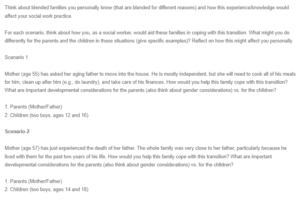Supporting Families Through Transitional Caregiving and Bereavement as a Social Worker
Scenario One
I would begin by completing an assessment of the family’s needs, resources, and dynamics to assist the family in coping with the transition of the aged grandfather coming into the house. I would then support open and honest discussions between the mother and her children to address their issues and expectations about caregiving duties. Important developmental considerations for the parents include the mother’s potential physical and emotional hardship when she takes on caring obligations for her elderly father. The father may need to adjust to having another adult in the house and deal with any potential family problems. Due to traditional caregiving obligations, the mother may have a heightened sense of responsibility, potentially leading to feelings of stress and restricted personal time for self-care. The 12-year-old may want further assistance to understand the changes in home dynamics and may act out as a result of the changes, whereas the 16-year-old may be concerned about privacy and independence (DiClemente et al., 2022). As a social worker, I may have to manage my own biases and stereotypes about gender roles and caregiving obligations while remaining sensitive to each family member’s unique needs and experiences.
Scenario Two
I would offer bereavement counseling and assistance to the family, both individually and collectively, to address their emotional needs and the loss they have endured. It would be critical to encourage free communication throughout the family in order to share recollections and emotions about the grandfather. Given her strong relationship with her father, the mother may experience tremendous sadness and a sense of loss and may require professional grieving counseling. While dealing with his own sadness, the father may need to provide emotional support to his wife. Because cultural expectations and conventions might influence their experiences, gender considerations may include recognizing and addressing any variations in how individuals express and process their sorrow. The 14-year-old may need assistance comprehending and expressing their emotions (Twiner et al., 2022). The 18-year-old may be navigating the grieving process as a young adult, which may entail establishing their own support networks outside the family. As a social worker, I would approach this issue with empathy and cultural understanding because bereavement processes differ greatly among individuals and families.
References
DiClemente, K., Sarah Elizabeth Neville, Berent, J. M., Farrar, J., Mishra, T., Abdi, A. I., Beardslee, W. R., Creswell, J. W., & Betancourt, T. S. (2022). Understanding mechanisms of change in a family-based preventive mental health intervention for refugees by refugees in New England. 60(1), 142–155. https://doi.org/10.1177/13634615221111627
Twiner, A., Lucassen, M., & Tatlow-Golden, M. (2022). Supporting children’s understanding around emotions through creative, dance-based movement: A pilot study. Learning, Culture and Social Interaction, 37, 100659. https://doi.org/10.1016/j.lcsi.2022.100659
ORDER A PLAGIARISM-FREE PAPER HERE
We’ll write everything from scratch
Question

Supporting Families Through Transitional Caregiving
Think about blended families you personally know (that are blended for different reasons) and how this experience/knowledge would affect your social work practice.
For each scenario, think about how you, as a social worker, would aid these families in coping with this transition. What might you do differently for the parents and the children in these situations (give specific examples)? Reflect on how this might affect you personally.
Scenario 1
Mother (age 55) has asked her aging father to move into the house. He is mostly independent, but she will need to cook all of his meals for him, clean up after him (e.g., do laundry), and take care of his finances. How would you help this family cope with this transition? What are important developmental considerations for the parents (also think about gender considerations) vs. for the children?
1. Parents (Mother/Father)
2. Children (two boys, ages 12 and 16)
Scenario 2
Mother (age 57) has just experienced the death of her father. The whole family was very close to her father, particularly because he lived with them for the past two years of his life. How would you help this family cope with this transition? What are important developmental considerations for the parents (also think about gender considerations) vs. for the children?
1. Parents (Mother/Father)
2. Children (two boys, ages 14 and 18)


